B.C. leaders making a difference
British Columbia has a long history of incredible people who are making change in our society. From well-known public figures to people working quietly behind the scenes, they are breaking down barriers, standing up for change and fighting for equality.
View profiles by last name:
| A | B | C | D | E | F | G | H | I | J | K | L | M | N | O | P | Q | R | S | T | U | V | W | X | Y | Z |
C
Zoe Craig-Sparrow
Co-Director Justice for Girls
As a human rights scholar, an Indigenous feminist academic and Co-Director of Justice for Girls, Zoë knows she has a unique skill set that can help effect change.
Zoë first realized the power of youth voices when she went to the United Nations at 15 to speak to the UN Committee on the Rights of the Child about the impacts of environmental degradation on children’s rights – particularly Indigenous girls.
By speaking on behalf of the children of Canada to safeguard the future, Zoë realized that everyone has their own unique skill set and ways to make change. It was the realization that one person can touch so many people’s lives and help shape the future that really propelled Zoë to continue her education and pursue her career path.
Growing up on the Musqueam Indian Reserve, Zoë had the benefit of living in a close-knit community. However, she also began to understand the stark inequalities and colonial circumstances that exist, which forced her people to live on a small reserve while others reaped the benefits of their entire traditional territory.
Intergenerational barriers of colonialism also shaped her journey as until 1951, First Nations people would lose status if they graduated from university. This meant there were not a lot of female Indigenous scholars and academics to look to for guidance. As the first person in her mother’s family to get a university degree, Zoë is forging the way for her younger siblings and others in her community.
With her family supporting and believing in her, the urgency of the issues facing the world is helping motivate Zoë to overcome the challenges she has faced. Being educated on her rights, legal and political systems and social justice issues has also been critical. In response to threats of climate change, gender inequalities and violations of Indigenous rights in Canada, Zoë feels obligated, motivated and empowered to overcome any challenges she faces and to be a leader.
The resilience of Indigenous women and girls is what inspires Zoë the most. Women who continue to fight for their children, their culture and demonstrate strength, compassion and love while facing the deepest levels of poverty and vulnerability to racialized male violence.
Zoë’s advice to those who are just starting out is do not underestimate the power of your voice. The youth voice is extremely powerful and important, and it is crucial to know and exercise your rights. And, if your rights aren’t being fulfilled, or the rights of those around you aren’t being fulfilled, take action and pressure decision-makers to make change. History, she says, is defined by change-makers and since youth are inheriting the world from the older generation, let’s be the change we want to see in the world – starting today.
She also says that education can be a powerful tool and encourages youth to pursue educational opportunities, while recognizing that many youth can face barriers to educational success. Leadership and empowerment, she says, go hand in hand, and in order to be a leader, you must be empowered. In order to lead others, you must also empower others.
Learn more about Zoe and Justice for Girls: http://www.justiceforgirls.org/
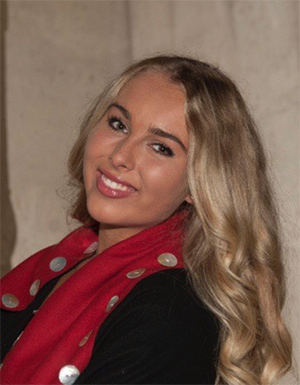
Sarah Crowe
Nurse Practitioner, Surrey Memorial Hospital
“Don’t be afraid to push the boundaries of your comfort zone and know that you are capable of more than you think.”
Sarah Crowe is a nurse practitioner with a unique role as there are only a few in the entire province who work in the critical care environment. While nursing has traditionally been a female-dominant career, being a nurse practitioner means functioning as part of the medical team as well as the nursing team.
Sarah has an active clinical practice where she cares for patients and their families, and mentors and teaches nurses. Sarah is also a researcher with a focus on Intensive Care Unit survivorship and care of teams.
Having been in health care for more than 20 years, Sarah knows the role has challenges, including being accepted for what nurse practitioners bring to the team. At times, patients, their families and even some nursing groups may also find it difficult to understand the position.
Working in healthcare during COVID-19 has been an additional challenge on many fronts. The pandemic has meant a greater focus on virtual services, which can be difficult for some patients and their families. It has also meant caring for critically ill people who are not able to visit with family. “It was heartbreaking,” Sarah says. “And it was the nurses that were there to support them.”
There was also the added stress for the staff in trying to reassure their own families that they were safe and not exposed to the virus. Unfortunately, some staff also encountered people who treated them differently because they cared for patients with COVID-19.
The pandemic has taken an emotional toll as well. When the pandemic first hit, the anxiety surrounding the unknown and fear of what was to come as the pandemic evolved around the world was extremely difficult.
As a leader, Sarah felt like she had to be the voice of reason and calm to support the team and de-escalate some of the heightened emotions. Sarah’s aim was to validate worries and concerns, and also reinforce information about how they were keeping everyone safe, that their PPE was adequate and that they had a plan.
Although many in the critical care teams are exhausted and feel stretched to their limits, Sarah is so proud of the work they have done. She expresses the importance of taking care of each other to ensure everyone stays healthy - physically, mentally and emotionally.
She also hopes that some of the newfound kindness people have shown each other continues. For those working in the medical field, Sarah says there is also a greater appreciation for each other’s role and value on the team. “Care of patients does not happen without the entire team,” Sarah adds. “Whether that’s the housekeeper, the bedside nurse or the medical provider, we are all necessary and all valuable.”
Sarah reflects that many nurses are seen to “just do the work” and are often quiet and humble in their accomplishments. She acknowledges that many nurses frequently support other’s projects, including physicians, pharmacists and academics, rather than lead their own.
It is for this reason that Sarah advocates for nurses and nurse practitioners to have a bigger voice and be proud of the amazing work they do for the people they support. Sarah encourages the upcoming generation to understand and recognize their value – and to see themselves as leaders.
For Sarah, knowing that she is more resilient than she thought and what she does matters has made all the difference.
She also encourages young people not to settle for the status quo, not to be afraid to push the boundaries of your comfort zone and know that you are capable of more than you think. Sarah notes that having been an introvert her whole life, it has taken a long time for her get comfortable as a leader and to have the self confidence that she has now.
In addition to being a Nurse Practitioner, Sarah is the Vice President of the Canadian Association of Critical Care Nurses and has recently published a research study examining the impact of the pandemic on front line critical care nurses. Sarah is also Co-Chair, Scientific Committee, World Critical Care Congress 2021 and Adjunct Professor, UBC School of Nursing.
We acknowledge Sarah, her team at Surrey Memorial Hospital and the many people in the heath care system who are working around the clock to see us through the COVID-19 pandemic. Thank you, Sarah!
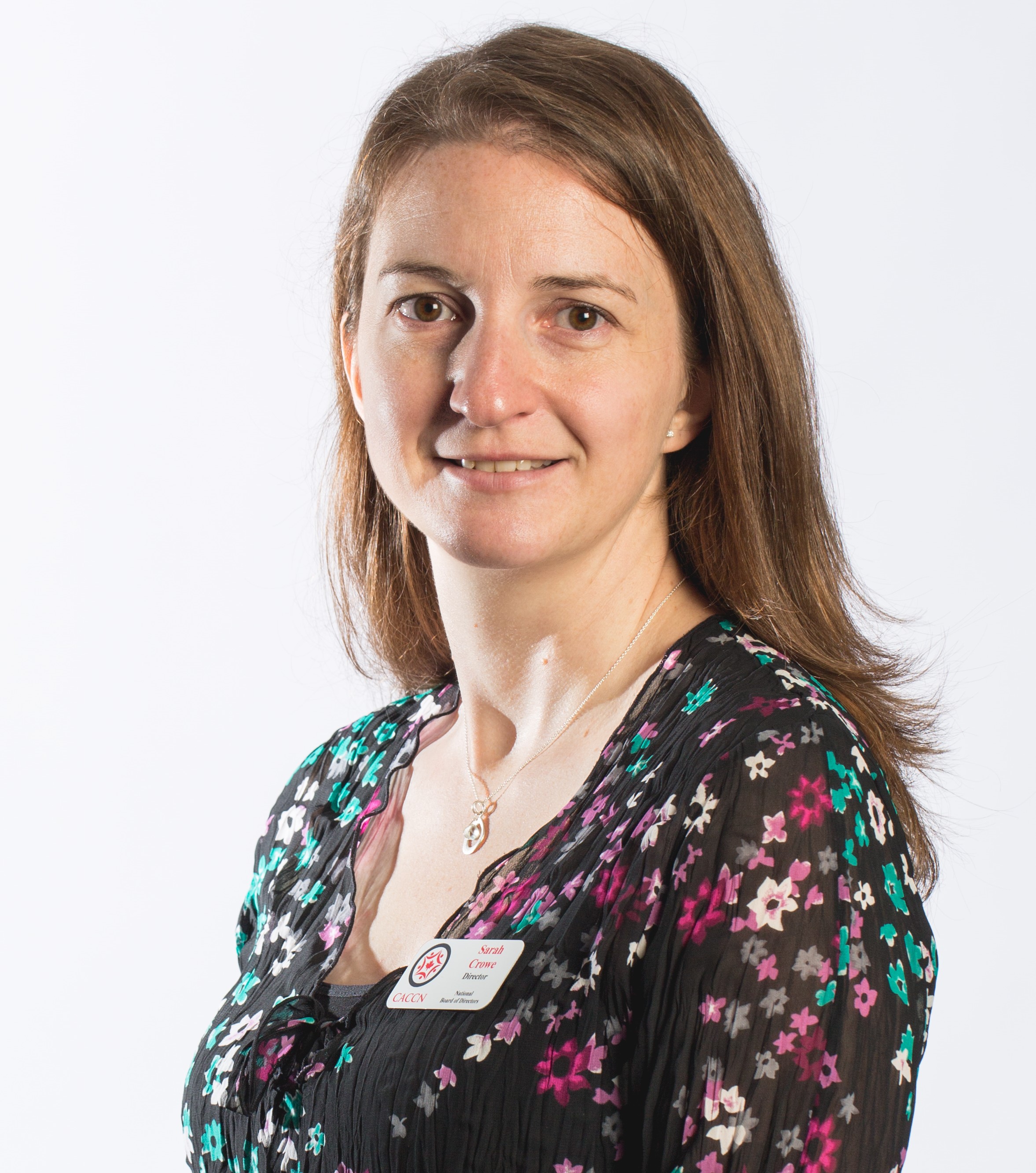
F
Cheri Franklin
handyDART Driver, Kamloops
“We can do so much when we set our minds in a positive and generative direction.”
Cheri Franklin has been driving handyDART in Kamloops for 12 years and the people she supports rely on her experience, dedication and compassion. Many would not otherwise be able to access medical appointments or essential trips. And for Cheri, the job means so much more as on any given day she is everything from a driver, friend, counsellor and listener.
As a woman working in the transportation field, being seen as an equal has not always been easy. In many ways, Cheri finds this has also been insightful in terms of how the elderly and people with disabilities must sometimes feel. Cheri says, “everyone is equal in their own right and we all can learn so much if we just open our hearts to accept each person for who they are and what they have to offer.”
Especially since all woman, including trans women and LGBTQ2S+ people, have a lifetime of amazing accomplishments and stories to tell.
Cheri reflects on the fact she has had to work very hard to get where she is now. She entered the workforce as a young, single mother of two with neither a diploma or a degree. She was also a survivor of domestic abuse. She started out cleaning up after fires and floods, and cleaning houses and commercial buildings. Then she began driving – semi-trucks at first and now handyDART buses, which has traditionally been a male-dominated industry.
Today, while there are many women at Cheri’s worksite, the opportunities to bring in more women still remain. Pushing her career forward is important to Cheri, not just for herself but also to pave the way for her girls.
Like so many others, the COVID-19 pandemic has showed Cheri that as a society, kindness, patience, love and most of all companionship are what keeps us going as human beings.
Cheri has been told she has an innate ability to bring people together and be their voice. If there is an issue, she will get the bottom of it and find a solution. Especially in a crisis, women have an ability to work together and brainstorm like no other force.
While the stress of the pandemic has been wearing on everyone as a society, many women have stepped up more than normal with work, children and household chores. Cheri knows that she has always been strong but has learned recently to lean on friends for support in a whole new way. Realizing that she doesn’t need to bear everything on her own has even made her stronger.
As a survivor of domestic abuse, Cheri also expresses concern for an increase in violence during the pandemic for women housebound with an abuser. Cheri encourages women facing violence to seek help and know that they can enter the workforce and feel safe there. For people facing or leaving violence, being a part of the workforce also means financial independence and recovery.
Cheri stands up for what is right and shows support for people when no one else will. Cheri is determined to be treated equally and make a difference for others.
For young people starting out on their career, Cheri says, “don’t let anyone steal your fire and listen to your gut.” We can do so much when we set our minds in a positive and generative direction, she adds, do not wait to do whatever it is you choose to do.
We acknowledge Cheri, the people she supports in her job, her family and friends for being there for each other, sharing inspiration and never giving up. Thank you, Cheri!

G
Kasari Govinder
BC Human Rights Commissioner
Growing up in a mixed-race family, with an Indian father who was raised in apartheid South Africa, Kasari Govender was no stranger to how forces of systemic racism could shape individuals, families and communities. It was, however, through witnessing what it looked like to stand up against racism, and the value of social and legal activism in changing societies, that Kasari came to work in law, and, eventually, as BC’s Human Rights Commissioner.
Kasari admits it can be difficult, and sometimes lonely, to be young, to be a woman, or to be a person of colour in the legal profession or in leadership roles. One has to work harder, she says, to be taken seriously. However, seeing the ways in which systemic inequality effects us all is part of what motivates Kasari to continue the fight for equality. “We only have so much time on this earth,” Kasari says in regard to using her specialized skillset to support these changes. “There’s no time to waste on work that isn’t meaningful to me. Watching those around me forge their own paths and create significant social change-- especially those who have gone before us– is a continual source of inspiration.”
Another huge source of inspiration and support for Kasari has always been her mother. Her mother, described by Kasari as a compassionate, strong feminist, dedicated her career to fighting violence against women. She taught Kasari to stay grounded in herself, her family, and her values, no matter what stresses or dilemmas came her way. And she continues to support Kasari in other ways, like caring for her grandson during Kasari’s working hours.
Kasari’s strongest advice is to build community wherever one goes, because working together means so much more is possible. This, she says, is especially important in human rights and social justice work, which can be emotionally and psychologically taxing. “Building up a community around you,” she says, “will offer you support …provide inspiration …and allow you to champion those around you in their own career paths, which in turn leads to greater progress on our shared goals.”
It’s important, Kasari acknowledges, to name and recognize the barriers and disadvantages that individuals face. Still, she says, “we need you!” Bringing your lived experience to your work is nothing to be ashamed of, and can be a great source of strength not only in human rights, but across many fields. Reach out for support, be kind to yourself and others, and know, she says, that it’s never too late to start working towards your goals. Looking for a sign that you’re on a good track? “If you’re surrounded by people that inspire you,” Kasari advises, “you’re probably in the right place.”
Learn more about Kasari and the Human Rights Commission
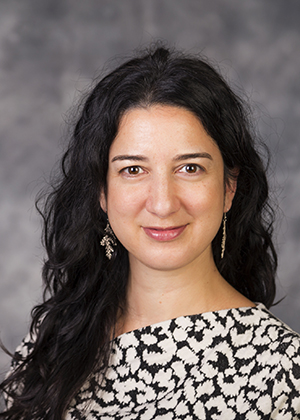
M
Angie Maitland
Director of Education, Haisla Nation Council
“Stay true to who you are and believe that you can do anything you set your mind to.”
As the Director of Education, and an experienced early childhood educator, Angie Maitland oversees the C’imo’ca Headstart Childcare Centre and the Infant Toddler programs in Haisla (Kitamaat Village), as well as the Haisla community school. In addition, Angie manages youth programs, the local recreation centre and oversees Haisla members attending school outside of the community. As the Director of Education, and an experienced early childhood educator, Angie Maitland oversees the C’imo’ca Headstart Childcare Centre and the Infant Toddler programs in Haisla (Kitamaat Village), as well as the Haisla community school. In addition, Angie manages youth programs, the local recreation centre and oversees Haisla members attending school outside of the community.
Angie has also been recently recognized by the BC Aboriginal Child Care Society for her hard work and for making a big difference in her community.
It was Angie who wrote a significant proposal that brought a new child care centre to her community, and she also secured the funding and managed the entire project. As a result, the community has an amazing new facility that includes a full Haislakala immersion preschool program called the Language Nest. The project was no easy task, but Angie says her parents taught her that she is capable of anything she sets her mind to.
On any given day, this could mean consoling a child with a band-aid, hanging up a bulletin board or tackling an oil change – there is really no task that she won’t try. For young people looking to their future, Angie says “stay true to who you are and believe that you can do anything you set your mind to.”
Angie also knows it’s ok to ask for help and to allow those around her to do so. Angie’s team is comprised of proud, confident and caring women who provide support for children and their families. As the team leader, Angie feels respected and can say what’s on her mind and know she is listened to.
Like many women, Angie has felt more pressure during the COVID-19 pandemic as people need more time, understanding, guidance and care. With a staff of 43 people and a growing family, it can be challenging to support everyone.
However, Angie and her family are resilient, take things in stride and move forward. Angie says her amazing husband of 24 years, who is also her high school sweetheart, is an equal partner so there are no extra issues when she comes home from work. She also advocates for self-care and time to recharge, which is not always easy, but she says she’s working on it.
There is added reason for celebration this March as Angie is going to be a first-time Grandmother. As a trained Doula, she can be at her daughter’s side to welcome the new baby to the world.
Angie is extremely proud to work with the Haisla Nation as this has meant being a part of a community that has always come together in times of need. During the pandemic, the community has been united and supported each other from isolation, helped with meals and demonstrated encouragement.
Angie observes that the pandemic is a trauma that many people are dealing with on top of already existing traumas and encourages people to be patient and caring towards one another. She says that each person is living in their own COVID world as far as worries or anxiety and we need to be supportive of one another.
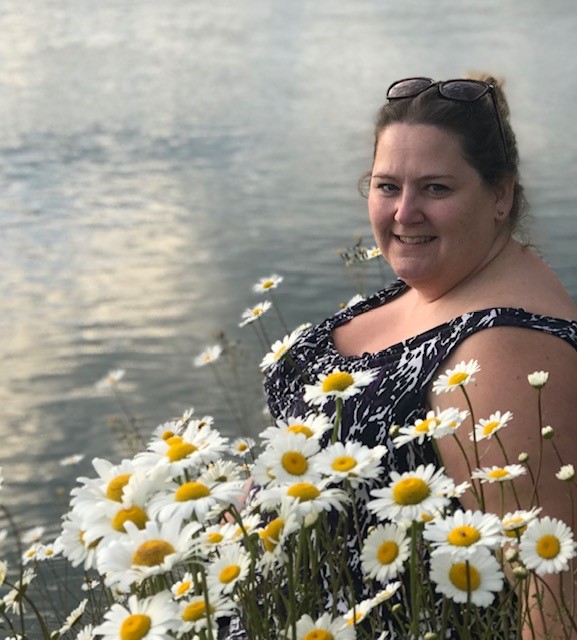
Dr. Charuka Maheswaran
Public Health Physician-in-Training
“COVID-19 has been a lens to show the fractures we already have in our society.”
It’s been a long journey for Dr. Charuka Maheswaran to arrive at her current home of Courtenay on Vancouver Island, where she spent 17 years as a general practitioner and is now a public health physician-in-training. Born in Sri Lanka, where her parents endured brutal colonial rule and a bloody civil war that raged throughout most of her young life, Dr. Maheswaran cites her family as lucky to have had the opportunity to emigrate to the United Kingdom. She was, as she describes it, “welcomed and loved in Wales” and still misses the sight of hillsides covered in golden daffodils in the Welsh spring. Eventually she came to British Columbia, where she has lived for nearly a decade. “I know in my soul that this is where I [will] raise my children, grow old and die.” Dr. Maheswaran says. “We immigrants choose the place we want to belong to.”
Dr. Maheswaran approaches her work as a doctor with strength and compassion, perhaps gleaned from so many extraordinary life experiences from a young age. This empathy carries over into her thoughts on the pandemic and its widespread effects on our communities. “COVID-19 has been a lens to show the fractures we already have in our society,” Dr. Maheswaran says, and sees this as a time to “acknowledge the issues, how far we have come, and how much further we need to go to redress the imbalances. [We must] recognize that marginalized peoples are there because of power and structural inequities that will take all of us working together to fix.”
This thoughtfulness is reflected in her career choice too. “Work brings structure to your day and purpose to your life,” she says, “if that work makes someone else’s day a little better too, then you’ve found the thing you should spend your days doing.” Her passion for her career can be seen in the standards to which she holds it. She describes her children as her “world and life”, and thus her job must be worth doing in order for her to be away from them. “If you don’t do something as important or worthwhile as raising your child,” she advises, “then you need to find something else.”
While it’s clear practicing medicine is something of great value to Dr. Maheswaran, her journey has not been without its challenges. Speaking with frank honesty, she describes growing up in the 1980s, when racism was pervasive, and becoming a young woman in the 1990s, when sexism and sexual harassment were commonplace. She has seen a great deal of positive change, albeit slowly, and cites Doctors of BC as an organization very receptive to the evolving medical culture. But she knows a challenging and complex paradigm shift throughout all of society is required to eliminate systemic sexism and racism, embodied in the objectification and othering she stills experiences. “There is [still] an expectation from medical colleagues, other health professionals and patients, of what a doctor should look like and how they should be and behave,” Dr. Maheswaran says.
Dr. Maheswaran has observed these deeply embedded systems and their effects throughout the pandemic. She notes the increase of divorces resulting from lockdowns, as women see how much they do in comparison for tasks that should be shared in the home, and a disheartening increase in intimate partner violence. She hopes one positive outcome of the pandemic might be an acknowledgement of the pervasiveness of domestic violence, with an accompanying movement to spark conversation and action in families and throughout society.
As a woman of colour working in a male-dominated field, Dr. Maheswaran’s career has not been without its challenges, but she remains optimistic about the progress she’s seen. “Of course I have experienced racism and sexism, and that special brand of both—misogynoir—faced by women of colour,” she says, “but I know this is more than my grandmother and beloved aunt ever dreamed for me. I am my ancestors’ wildest dreams and most daring hope, and for that I am humbly grateful.” Dr. Maheswaran sees this same hope in her own daughter and a young generation of shifting attitudes and open minds, and she is heartened by what she is witnessing. “Once freedoms and equalities are achieved,” Dr. Maheswaran says, “they’re hard to push back.” With COVID-19 having proved our world can shift in ways never previously imagined, Dr. Maheswaran’s wildest dreams for her own children feel more possible than ever.
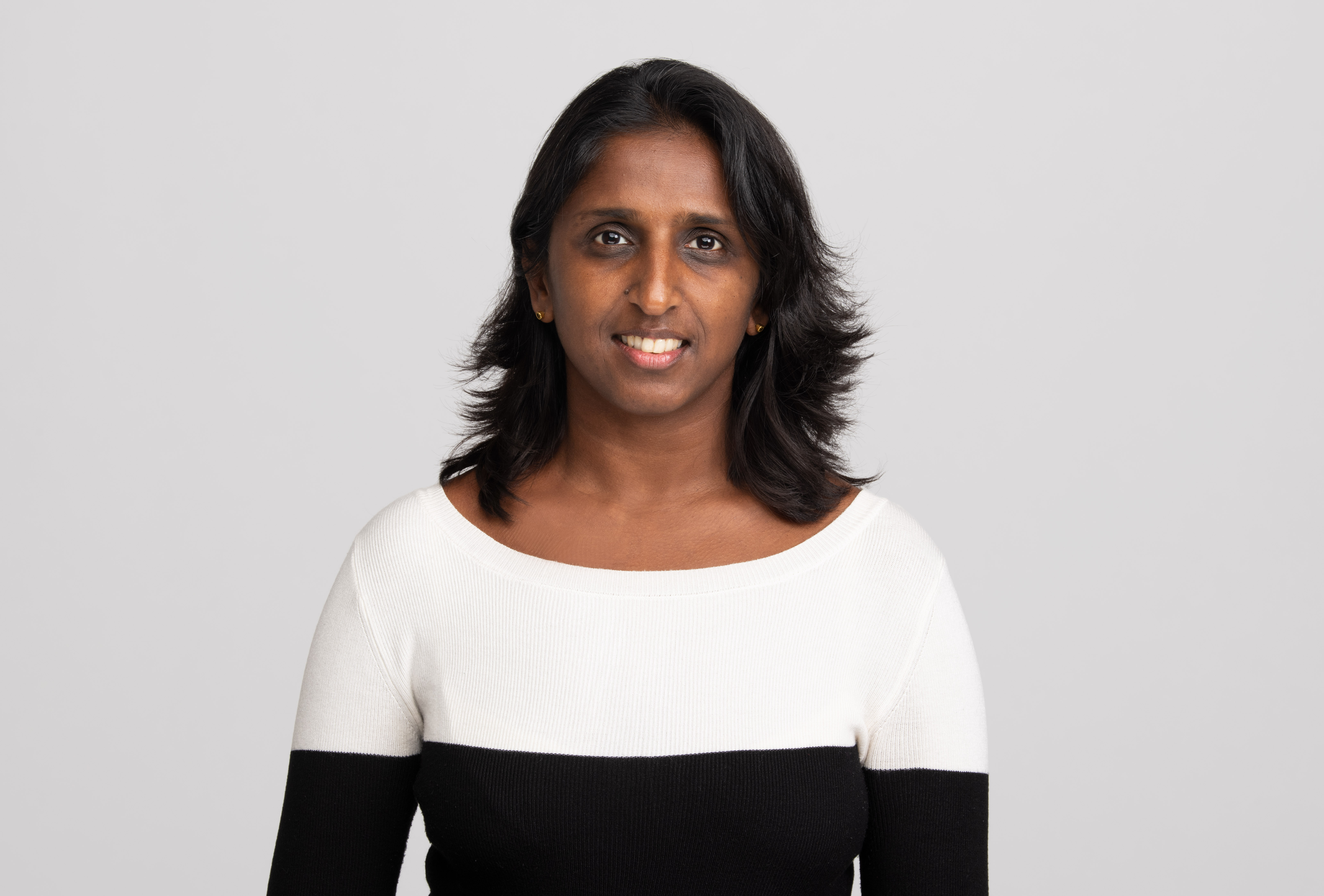
N
Cybele Negris
President, CEO & Co-founder webnames.ca
Cybele has been an entrepreneur for most of her career. Following the exit of a start-up in the late 90’s, she met one of the pioneers of the Canadian Internet who was working to preserve a Canadian online identity by founding the .CA domain name. With the collaboration of a small team, Cybele worked to build a website that was the genesis of Webnames.ca, a company that grew from three to 30 people in just four months and generated $2.5 million in the first year of operation.
As an Immigrant, visual minority, mix-race woman in the male dominated industries of construction and technology, Cybele felt she had to earn her credibility, especially in her youth as she appeared much younger than her age. Often, it was automatically assumed that she was the spouse or executive assistant of a male business partner.
While external biases were a constant hurdle as a woman in the industry, sometimes the biggest challenge was self-doubt, which kept Cybele from putting herself forward to speak at events or be the public face of her own company. This took time and work to overcome.
When Cybele won the Top 100 Most Powerful Women in Canada Award, she felt proud yet also as if she didn’t deserve to win. She was CEO of a successful technology company, yet she did not have a technology background. Over time, she started to talk to other highly successful women and realized so many of them felt the same way. This led to her written works on Impostor Syndrome, which Cybele has also spoken widely on.
As a woman in tech, Cybele learned to embrace being the only female in a room. Over the last decade, she has also helped other women see this as an opportunity to stand out and look at it as an advantage. Based on her own experience, Cybele feels this is a responsibility in order to pave the way for the younger generation.
Even today as she takes on new challenges or sits on a new board, Cybele still gets a twinge of those feelings of “do I deserve to be here?” But those fears and self-doubts are far shorter and drive her to work even harder.
For Cybele and the team at Webnames, they love to see customers succeed and act as their ally on the web, supporting companies as they grow from small to big businesses. Keeping local talent onboard is also very important, as is getting more women and girls involved in technology.
This is one of the reasons Cybele is involved on the board of Science World and a champion for the annual Girls and STEAM event, which inspires 300 11 to 13-year-old girls to consider science, technology, engineering, art and mathematics (STEAM) as careers. As a female CEO and co-founder of a thriving technology company, Cybele is a long-time advocate for women and girls in STEAM and finds numerous opportunities to be a mentor and role model for young entrepreneurs and women aspiring into these careers.
For young people who are just starting out or someone who is facing barriers, Cybele says feel the fear but do it anyway because anything new feels uncomfortable as it is unknown. FEAR, she says, is False Expectations Appearing Real. Today, Cybele regularly put herself into uncomfortable situations and gets accustomed to being ok with it. Get comfortable with being uncomfortable is her advice. She also acknowledges that we often hear that if you have passion for what you do, it won’t feel like work. This, she says, is only partially true, as you also need grit and perseverance to get through the tough times, which everyone experiences. Cybele also recommends going into each venture with a vow that failure is not an option as it is that winning spirit that will help you rise.
Cybele encourages everyone to look for the opportunity in every situation, surround yourself with smarter people than yourself, listen and learn continuously. A support network is also very important, whether you get it from a spouse or a network of friends. If the risk is worth taking, then find a way to overcome your barriers and if you need help, ask for it. There are great people willing to offer their time and support through mentorship and collaboration.
Learn more about Cyble and webnames.ca
For Cybele’s exceptional insights into Impostor Syndrome, please visit:
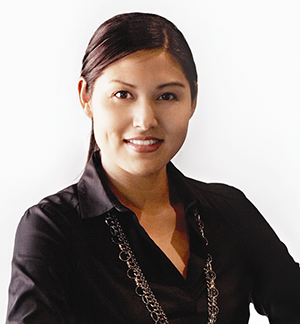
Savanah Norman
Assistant Director of Development Justice for Girls
Savanah comes from a family that has always stood up for what is right and giving a helping hand whenever they can, even when they had little themselves. Savanah’s grandmother, Diane Freed, who she is very close with, has been a feminist activist for more than 50 years. In fact, Diane opened the first women’s shelter in Dawson City during the 80s to help women fleeing violence.
One of the earlier influencers of Savanah’s career was a youth and family worker who supported her goals of graduating high school and applying for an internship at Justice for Girls when she was 17.
At age 21, Savanah recognizes there are many challenges and biases on the horizon. She is sometimes mistaken for being an intern rather than a staff member due to her youth, but she does not let that hold her back.
In fact, it was her experiences as a teenage girl and seeing the experiences of the women and girls in her life that continues to drive her. For Savanah, the personal is the political and feels if she is lucky, then one day she will work herself out of a job. But until then, there remains a need for systemic and social change. A more just and equal society benefits all people, she wisely says, regardless of gender.
In Savanah’s career, she sees first hand the impacts of poverty on girls, which impedes access to education, as well as increases their vulnerability to male violence and exploitation. The effects of poverty and violence are compounding barriers to young women’s success. Without a high school education, which is still out of reach for many, it is difficult to earn a liveable wage. If mothers are poor, therefore their children are poor and as well as for those living with an abusive partner and can’t afford to leave, the cycle of poverty continues.
The community at Justice for Girls has been a tremendous help for Savanah in terms of ongoing support, fellowship and confidence. The feminist approach has allowed Savanah to begin healing from her own experiences of trauma while doing work which promotes equality, freedom from violence, and the health and wellness of teenage girls who live in poverty. Justice for Girls has empowered Savanah to pursue a post-secondary education, one she once never deemed possible.
It is the resilience and strength of girls that really inspires her, especially those who have risen out of violence, poverty and racism to become leaders and advocates in their community and effect social change. The Justice for Girls internship program is a shining example of where girls are given the opportunity to recognize their strengths and build critical thinking skills. Justice for Girls believes that girls are the experts of their own experience, and should be at the forefront of designing law, policy, and programs that affect their lives.
For those just starting out or making a change to pursue their goals, Savanah says do not be afraid to ask for help. Often the expectation on young women is to be completely independent but what everyone really needs in interdependence, with a network of supports in place to guide you as you navigate the world. Her advice is don’t allow yourself to be easily discouraged and know your rights and what you’re entitled to.
Learn more about Savanah and Justice for Girls

P
Tamara Pongracz
Chief Instructor BCIT
When Tamara Pongracz began working as a welder’s helper in the 1990s, the percentage of women in trades-related jobs and industries was believed to be around 2-3%. Female representation was so low, when she received a letter of welcome into her plumbing apprenticeship program, it was automatically addressed to Mr. Pongracz. Tamara found her way to the British Columbia Institute of Technology (BCIT), eventually heading the Trades Discovery program. Now as Chief Instructor of Trades Access at BCIT, Tamara helps students find trades or career paths through real-world experiences. This includes the Trades Discovery for Women program, encouraging women to pursue careers in what was once known as the “final frontier”.
After high school, amidst the recession of the 90s, Tamara found minimum wage jobs were not paying the bills, let alone providing enough to save enough for post-secondary education. With the help of her father, Tamara found work in construction. The money gave her independence, allowed her to pursue education, and gave her post-secondary credentials and opportunities she never imagined otherwise.
But being a woman in a male-dominated field was one of the biggest challenges she faced in her early days working in the trades. As an Indigenous woman of small stature, there were many moments where she was forced to pick her battles, where being assertive rather than aggressive, or understanding the right moment to diffuse a situation with a joke was necessary. Her father advised it wasn’t her job to change the culture of the industry she entered. “Don’t try be one of the guys,” he told her. “Don’t demand they change their ways for you. If you earn their respect, their world will be your world too.” Tamara came to appreciate the focus on teamwork in trades-- “At the end of the day,” she says, “We’re all on a deadline and have to get the work done together.” Even so, a strong sense of self was crucial, and, as her confidence grew, she made many male allies on the job, who cheered her along the way and still do.
Now Tamara is able to pass her shared knowledge on to her students, who she cites as her biggest inspiration. “I’m always excited to see underrepresented groups thrive and provide opportunities to support them,” she says. “It’s been amazing see the strides made, along with the increased support of the government for women in trades. It really energizes me to continue.” Her advice to those following a similar path to hers is to “own your greatness, value your lived experiences and take advantage of every opportunity.” It’s important, she says, to recognize that the barriers a woman may face have been encountered by those before her—knock ‘em down, and be sure to leave the door wedged open as you go, so others can follow the same path.
Learn more about Tamara and BCIT's Trades Access
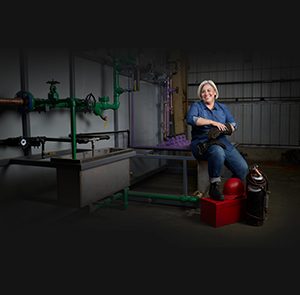
Tracy Porteous
Executive Director, Ending Violence Association of BC
Back in the early 1980s, when Tracy was 19, she decided to volunteer at the then-new Victoria Women’s Sexual Assault Centre. Their intensive training, which was designed to equip volunteers to answer the crisis line and accompany survivors of sexual assault to the hospital and police, led Tracy to make a life-long commitment to helping and supporting survivors who have faced violence.
She realized later that her intense feelings about the importance of providing survivors with help was directly related to being sexually assaulted herself at age 14. “Sexual assault is a life-crushing experience that can destroy a person,” says Tracy of her own experience and those she has heard and seen firsthand from many other survivors. “It was evident in the 1980s and remains so to this day that having a skilled advocate can mean the difference for their survival.”
Still in the early 1980s, building on her volunteer work, Tracy began working as a project manager at the Sexual Assault Centre and, along with two other young women, wrote a booklet aimed at teenage girls called Let’s Talk About Sexual Assault. The booklet won a national award for crime prevention and became a Canadian bestseller.
Over those years, Tracy attended every training course available to build her skills and knowledge of gender-based-violence-related trauma, counselling and support, laws, legislation and more. She also began coordinating volunteers and gaining experience in every position in the agency.
In her later role as the agency’s Executive Director, it became clear that the sexual assault centres in B.C. and the many community-based victim assistance programs had no voice at the provincial level, no one looking out for them. This led to what is now the Ending Violence Association of BC or EVA BC, an organization with more than 300 programs and initiatives, and a steadfast team of dedicated staff who bring support and a collective voice for people who have faced violence and for the workers who support them.
Tracy gets her inspiration from anyone who, despite many obstacles, has found the courage to speak up about what has historically remained in silence and in a world that would rather not hear about such things. Whether it’s a survivor, a parent, a sibling of a survivor, or a politician, Tracy believes that speaking up is the antidote to violence.
Tracy says that even today, it’s not easy for people to speak about traumatic events that are deeply humiliating. Most people have never been given permission to talk about these things and others don’t know how. In fact, she points out that sexual assault continues to be largely invisible.
It was ten years ago, in response to a dramatic increase in domestic violence homicides in BC, that Tracy and her team at EVA BC decided to create a “game-changer.” They approached the BC Lions Football Club to ask that these big, burly, masculine icons become spokesmen for a campaign to prevent gender-based violence. The resulting Be More Than a Bystander campaign has been a resounding success.
Historically, people have viewed sexual assault and intimate partner violence as women’s issues, but because it’s men who commit these crimes, gender-based violence also needs to be seen as a men’s issue. The Be More Than a Bystander Program is premised on the fact that the vast majority of men don’t commit violence against women, but because the vast majority of violence against women is committed by men, men must be part of the conversation, become part of the solution.
Sometimes, Tracy says, it just takes deeply respecting and being still enough to allow you to hear what someone wants to tell you about a very difficult experience they have lived through, providing sacred space for them to talk and begin to heal. The individual transformation in people who have survived violence is a huge privilege to witness.
Being involved in policy change and seeing systems change like police, military, and other male-dominated industries is also what keeps Tracy going. Tracy and others at EVA BC are taking the Be More Than a Bystander work, which began with the BC Lions, and implementing this in male-dominated industries to change the culture at workplaces.
Tracy feels very fortunate to have come across a path of work that has led to 38 years of helping others. Although there has been little public recognition of the issue and little funding, she has had the opportunity, many times, to see healing take place in the spirit of another human being. That, she finds, completely inspiring.
Tracy encourages all young people to try and find a path of service to others that not only provides a powerful sense of satisfaction and makes a difference in a broader sense, but also contributes to the healing and transformation of individuals.
For those facing barriers who may not believe they can reach their goals, Tracy says feeling unsure or insecure is a universal experience and it’s probably more common in women. She acknowledges spending a lot of her life feeling unsure and continues to feel this way about how to reach her own goal, which is to see a government sexual assault policy put in place in B.C. and to have sexual assault centres funded.
Tracy’s advice is to be part of a group, community, sector or work force that is bigger than yourself alone. That is one of the most powerful antidotes to isolation and insecurity. She encourages anyone who wants to make social change or find their path to seek out others who share the same vision.
At this moment in Canadian history, Tracy says we are at the centre of transformation related to gender-based violence and gender equality that sits on the shoulders of 50 years of feminist activism. EVA BC is now seeing institutions, systems and (some) governments coming forward in unprecedented numbers for assistance related to training, policy and best practices.
For more information on Tracy and the Ending Violence Association of B.C., please visit: https://endingviolence.org/
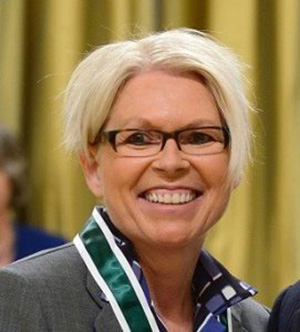
Sydney-Anne Porter
Owner and Manager, AG Valley Foods
“I hope COVID allows us to be less judgmental, to accept people and their choices for who they are.”
Sydney-Anne Porter has always had a soft heart. She describes herself as a young girl as compassionate and sensitive, and these kind traits have followed Sydney-Anne into adulthood, where they serve her well as a business owner and leader. Alongside her two sons, Sydney-Anne is owner and manager of AG Valley Foods, an independent grocery store in Invermere. She sometimes works seven days a week, and up to fourteen hours a day, when “cottage country season” kicks in during the summer. At one point she did all ordering for the store, but these days focuses on scheduling, bookwork, and oversees the bakery, deli and kitchen, always with an eye for improvements. Sydney-Anne is humble about her achievements - running a business is no easy task, and every element has been further complicated by the pandemic. While she’s seen plenty of kind and generous acts, there are always short tempers and people exhausted with COVID-related restrictions. Sydney-Anne, however, tackles these challenges and all the tough parts of life with no-nonsense determination.
While Sydney-Anne is quick to downplay her achievements as a woman in a male-dominated industry, it’s clear she’s always followed her own path, regardless of societal norms. “When I started in grocery 37 years ago, you did not see women as managers,” Sydney-Anne says. “I had a proactive male boss… [who] placed women in management roles. [But] people didn’t expect to see women in roles like that, or running the business. You’d have to ask, are you okay working with a woman?”
Sydney-Anne is glad she doesn’t have to ask that particular question anymore. Even if the beginning of her career was a “bumpy and challenging ride”, she doesn’t want to say she’s better than anybody, and shares with pride the equal opportunities for men and women in her store. “I’m thrilled every day that I can look at our staffing forecast and see men running the tills,” she says, “you never saw that when I was growing up. Now you go to the meat room, and see two out of the three people working there are women. The produce manager is a woman. We promote and hire based on what you can contribute.” It’s a balance, Sydney-Anne explains, so everyone has a “voice in the choir.”
Being in this leadership role “just feels normal” to Sydney-Anne. She’s immensely proud that she works alongside her sons, citing how much she learns from them. At a conference, she was once asked if she was disappointed that after working so hard to develop her business, that she didn’t have a daughter onto whom she could pass the torch. But to Sydney-Anne, it’s important to celebrate the successes of everyone. In fact, working in a grocery store over the pandemic has brought her a unique perspective on the changing roles of men and women. She’s been surprised over the years to see how many men now take on traditionally “domestic” tasks, like grocery shopping with the kids. As a newly divorced young mother, Sydney-Anne had to be “prepared to go out and fight” to survive. She got a job in a little corner store (noting with gracious amusement how this foreshadowed her future career) and prepared her family to live with less. “I stayed home with my kids - it was you’re the woman, you stay home - there wasn’t a choice. Now men and women make that decision together, looking at careers and seeing which person is more passionate about being home.”
In a post-COVID world, Sydney-Anne is looking forward to the healing. Invermere is a small community, and differences in opinions on how best to approach the pandemic can reverberate in this region. She hopes to continue to do her best in helping people be less judgemental, to accept others for who they are, and for their choices. She’s committed to doing the absolute best for her staff too. AG Valley Foods was recognized by the Canadian Independent Grocer of the Year Awards with gold for the 2019 Top Independent Grocer of the Year. It’s a reflection of her hard work and, as she says, “her heart”. She aims to treat every person she encounters, on every level, with respect and dignity. “I’m really proud of my wonderful sons and how they’ve celebrated my career by joining in,” Sydney-Anne says. “I will forever be grateful to our mothers and grandmothers for leading the way to this time where women get to enjoy equal opportunities too.”

S
Tina Strehlke
CEO Minerva BC
As CEO of Minerva BC, Tina Strehlke leads a team of thoughtful, talented change makers who develop, empower and promote women’s leadership. Tina credits her mother as the strong role model and influence who defines her as a leader. Growing up knowing her mom loved her work as an internist/oncologist - and was exceptional in her work - inspired Tina’s to be more than a leader. Her mom inspired her to make a difference.
It wasn’t always easy, even for one who was recognized as leader from a young age. As with many people, deep down Tina sometimes associated leadership as being masculine. As she was promoted into executive roles, at some level, it didn’t feel like real leadership because being drawn to supporting and empowering others wasn’t often celebrated in business, government or community. In a way, being a caring and encouraging person seemed smaller and less important.
Tina really embraces all the amazing women who work at Minerva for helping her re-define leadership. These are people who helped her understand society’s concept of leadership is out of balance, and that we need to value curiosity, humility, and empathy as much as we value other leadership traits.
These concepts and the opportunity to learn are what inspires Tina every day. For her, learning is at the heart of change. With this as a guiding force, Tina and her team at Minerva BC focus on developing strong, values-based leaders who have the inspiration and confidence to influence the world around them.
If there were just one thing Tina would say to someone who is starting out or making a change to pursue their goals, it is take bigger risks than you think you are ready for and ask people around you for help.
For those facing barriers or those who may not believe they have what it takes, Tina says take the first step. Put things in motion, then figure out how to navigate the first obstacle. Breaking your goal into smaller steps will allow you to think and solve problems in front of you. And it will help you figure out what you need to be successful.
Tina first discovered Minerva in 2001 when working as an employment counsellor at Training Innovations - a leading B.C. career development company specializing in in-person and online career solutions. She joined the Minerva team in 2016 and actively works to mentor and support women and girls to discover their strengths and develop their leadership skills.
Learn more about Tina and Minerva BC
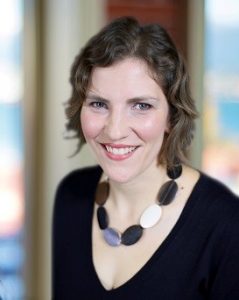
Angela Sterritt
Angela has seen journalism on Indigenous-related topics begin to improve, but her own career path has not been without its challenges.
“Being an Indigenous woman in any institution is hard,” she says. “You’re expected to do your regular job and then also educate and inform your colleagues about Indigenous issues too.”
She’s often blamed of being biased. She not only tells Indigenous stories but attempts to facilitate an understanding of them among colleagues, which leads to assumptions of telling only one-sided stories. She sees irony in this, her goal is to showcase the many dimensions of Indigenous people and communities, rather than the stereotypes in which they’re often shrouded. Angela has also learned to set boundaries: “We can only do so much,” she says, “with so many people wanting to learn more about Indigenous people, people need to educate themselves on their own time too.”
The support of women like Shiral Tobin, current director of journalism at CBC, and even the learning centre teacher, Donna Brack, of Angela’s youth, surely inspire Angela’s advice for those looking to pursue a similar career: “Don’t be afraid to reach out for help,” she says. “Sometimes you have to fight for your dreams, and you often can’t do it alone.” Angela cites Shiral, for example, as a supportive champion of Indigenous stories, who has pushed to see more Indigenous journalists at CBC.
It’s important, Angela says, to do what fills one with joy and excitement. Even life’s curveballs are there to provide further learning or strength for the next growth spurt. “It took many years to really feel that I am good at my job,” Angela admits. “And I am still learning, still falling down, still getting rejected and still getting right back up and trying my best.”
In the end, Angela says attitude is everything: Be kind, generous and helpful to your colleagues, and it will mean the difference between a dream team or rough work environment. Be confident someone out there believes in you. Don’t let a small group of people (or even a large group!) dictate your path. Love the challenges as those will lead to growth.
Even with her many accomplishments and experiences, Angela still craves a challenge, along with the revelations they bring: “I love being forced to see a story, person, community or issue from a new perspective. I learn something new and have my mind opened from every single story I do.”
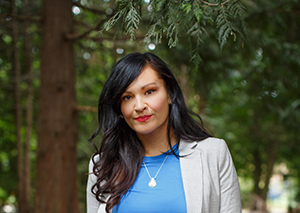
T
Jill Tipping
President & CEO BC Tech Association
Although Jill has always believed in the power of technology for people and the economy, it was a deeply personal experience that shaped her belief in the power of technology for good. Jill and her husband made the decision to undergo IVF, a revolutionary scientific innovation that allowed Jill to conceive her daughter, Veronica. It is this very belief that led Jill to the BC Tech Association where a small, scrappy, not-for-profit team pulls out all the stops to make B.C. the best place to grow and scale a tech company.
When first starting her career, it was still unusual to see women in positions of power. Fortunately, Jill had an outstanding role model in this respect, her mother. As a librarian in multiple settings, Jill’s mother worked towards her own professional goals her entire life. Her strong, Scottish mother always had a smile on her face and steel in her backbone. She showed Jill that being both career-minded and involved as a parent was possible, so Jill never once doubted that this, too, could be her future.
Many of Jill’s colleagues and trusted advisors have also been there for Jill throughout her career as both mentors and friends. For Jill, like any difficult hurdle one comes up against, seeking out someone who has come before you or who has your best interests in mind can provide extraordinary insight into a dilemma and encourage you to take the right steps.
At BC Tech, the team is involved first-hand in creating opportunities that benefit everyone. This means new jobs for British Columbians, opportunities for students and a more innovative economy for the entire country. For Jill, strengthening the technology sector and making a difference on this scale is truly inspiring.
The advice that Jill would give for anyone pursuing their goals is don’t be afraid of failure. Failure is how you know you’re pushing your limits, being courageous and brave, and fulfilling your purpose. Seek out challenges that frighten you and embrace them; do your best to learn from and build upon every experience.
For those who may not believe their goals are within reach, Jill says stand in your own space and own it fully. Articulate your goal clearly to yourself and to everyone in your life. There is nothing wrong with having big or stretch goals. So be sure to say them aloud and don’t keep them private. More often than not, you’ll find help from an unexpected quarter and while the path may not be straight, a long and winding road can be just as effective in the end.
In Jill’s career, she has often seen women being too hard on themselves and the dual roles they play in the workplace as Manager, CEO, or Director and at home as partner, mother, or caretaker. She urges women to be more accepting of themselves and the complicated positions they hold. The more empathy we can show to one another in this regard, the more likely we are to grow more accepting of ourselves.
Learn more about Jill and the BC Tech Association
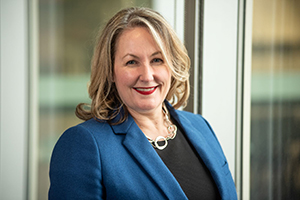
W
Denise Williams
Chief Executive Officer, First Nations Technology Council
On the day Denise was accepted into the Executive Master of Business Administration program at SFU, her career path changed. The timing was great as she had just started to build the First Nations Technology Council and needed to learn leadership skills quickly and on the fly.
The opportunity to ground her thinking and learning journey in a cohort of experienced leaders was instrumental, as was the exposure to a massive amount of material that has continued to help Denise build and scale her organization.
As an Indigenous woman in a leadership role, Denise has faced multiple challenges and biases. Although there is an increased interest in moving women – especially Indigenous women – into governance, advisory and public facing leadership roles, it’s not easy being one of the few holding space for the voices of so many others. Educating colleagues, providing emotional labour and value on subjects is no easy task, especially when the work means everything, is highly personal and you have to fight for the right to be heard.
This is a challenge Denise feels will be with her for the rest of her career. For Denise, however, the way to stand resilient is to build up a team around you that you can trust and that is capable of moving things forward when you need a minute to catch your breath. The saying: if you want to go fast go alone, if you want to go far go together rings true and Denise’s advice is don’t go alone!
With more Indigenous people’s access to digital and connected technologies in B.C., Denise and the highly driven team at the First Nations Technology Council are witnessing the power of Indigenous innovation and getting a glimpse of what will happen when all people have equal access and the ability to build stronger nations.
For those who are starting out or pursuing a new goal, Denise says you are remarkable, and you will do something significant in your journey. Her advise is to turn inward, not outward, to define who you are and what you want to do. The better you are at listening to your own unique perspective and ideas, the more likely you will be able to actualize something incredible, creative and game changing in this world. Don’t try to fit in, don’t let that voice get muted, and never just do what you’re told.
For Denise, showing up and facing barriers is the most important thing as long as you can do if safely and you have support. She acknowledges that overcoming barriers on the timeline in mind or in the way you wanted might not always happen but taking on something that feels impossible will make you a stronger leader and deepen your sense of purpose if you stay with it. She says there are no barriers that people are not capable of leaning into. She recommends share your struggle, talk about what you’re feeling, let your challenges be something the whole community can learn from.
To learn more about Denise and the First Nations Technology Council, visit: https://technologycouncil.ca/

